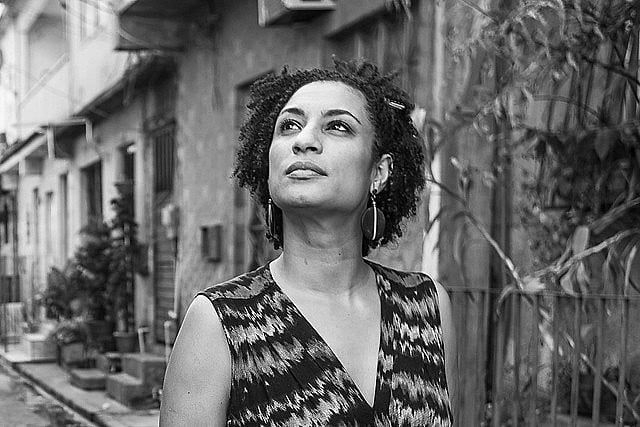Two suspects in the killing of councilwoman and human rights activist Marielle Franco and driver Anderson Gomes were arrested this morning in Rio de Janeiro, almost one year after the crime. It is still unclear, however, who ordered the assassination and the motive.
At 4:30 a.m. local time, 48-year-old retired military police officer Ronnie Lessa and 46-year-old former military police agent Élcio Vieira de Queiroz were arrested by a joint task force with the homicide division of Rio’s civil police and public prosecutors, who claim the two men are responsible for killing Franco and Gomes on the night of Mar. 14, 2018, in downtown Rio de Janeiro.
According to the charges brought by prosecutors Simone Sibilio and Leticia Emile against the suspects, Lessa was allegedly responsible for firing the shots that killed the victims and Queiroz allegedly drove the silver Cobalt that chased and ambushed them.
The investigation showed that the crime was meticulously planned for 3 months, so the police are also seizing documents, mobile phones, computers, and guns from the suspects. Evidence supports that Lessa was monitoring the events the councilwoman attended through a phone bought in someone else’s name.
The prosecutors also wrote in the charges that there is no doubt that Marielle Franco was “brutally executed for her political work defending the causes she did. The barbaric act committed on the night of March 14th, 2018, was a serious blow to a rule-based democracy.”
The joint operation that arrested the two suspects was dubbed Operation Lume, after an area in downtown Rio de Janeiro where councilwoman Franco promoted accountability to constituents every week and ran a project called Lume Feminista.
According to the news website G1, Lessa lives in the same gated community where Brazil’s president Jair Bolsonaro owns a house in the Barra da Tijuca neighborhood, west side of Rio.
Who ordered the murder?
Monica Benício, the widow of councilwoman Marielle Franco, told Brasil de Fato she heard the news about the arrests early in the morning.
“This is a very important step in the investigation. I applaud especially the prosecutors and the homicide department,” she said. “But we cannot forget that two days from today will mark one year since the execution. [It took] one year [for us] to have this answer, which should have been given a long time ago.”
Benício also said this new development is not enough to end the investigation. “We cannot forget that the most important question has not been answered: who ordered the murder of Marielle and what’s the motive behind this crime? More important than having these mercenary rats held responsible for what they did, the pressing, necessary issue is to know who ordered them to kill Marielle,” Benício points out.
About the next steps of the investigation, she says she hopes it won’t take as long to get official answers as it did to get to today’s arrests. “I honestly hope we don’t have to wait another year to get to this answer. But we cannot ignore that finally something is really happening about these investigations, and that has to be acknowledged.”
Legacy
On this year’s International Women’s Day on March 8th, thousands of women from all over Brazil honored Marielle Franco, a black lesbian activist from Rio de Janeiro’s poor communities who became a symbol of resistance against all forms of oppression.
For Monica Benício, her late partner is an inspiration “to keep resisting and fighting.”
“We can see the night of March 14 [the night of the murder] as not only a night of a barbaric, violent crime, but a night when we were able to give new meaning to hope. New meaning to resistance,” Benício said.
“Marielle has become a symbol of resistance as we see her picture all over the world, as people were outraged at the crime, but also acknowledged her work as a human rights defender, and not only her work, but what she represented. What she symbolized, which is a collective effort to build something much bigger than her own image.”
Demonstrations are scheduled to take place in several Brazilian cities on Mar. 14 to mark one year since the crime.
The case
Rio de Janeiro councilwoman Marielle Franco had a long history of fighting for human rights and was the fifth most voted-for member of council in the city’s 2016 election, skillfully bringing together gender, race, and class issues.
Days before her murder, when she was shot at least 13 times on the night of Mar. 14, 2018, she was appointed rapporteur to a committee established in Rio’s city council to monitor federal armed forces after they took over the city’s security in February. Anderson Gomes, who was driving the councilwoman home when the crime happened, was also shot dead.
Their execution provoked great uproar all over Brazil and the world. In May last year, the Organization of American States (OAS) held hearings and questioned the Brazilian State about the federal military intervention in Rio de Janeiro and the execution of the councilwoman and the driver, after twenty social organizations filed petitions with the OAS Inter-American Commission on Human Rights (IACHR) to hold the hearings.
Earlier this year, a newspaper reported that two women related to a fugitive from justice were staffers at the office of one of Jair Bolsonaro’s sons at the Rio de Janeiro state legislature until late last year. The fugitive is accused of having connections with the syndicate suspected of murdering Franco and Gomes.




